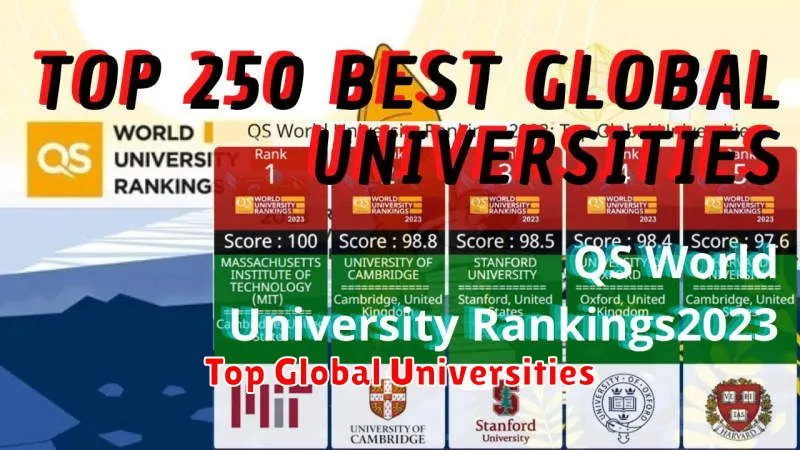In an ever-evolving world, education remains a cornerstone of career excellence and personal development. As 2025 approaches, identifying the top universities worldwide becomes crucial for aspiring students aiming to elevate their academic and professional prospects. This guide to the Top 10 Universities in the World You Should Consider in 2025 highlights institutions renowned for their groundbreaking research, versatile programs, and influential alumni networks. These prestigious universities offer unique opportunities to nurture future leaders and innovators on the global stage. Explore our carefully curated list to discover where your educational journey could take you next.
Introduction to Global University Rankings
In an increasingly interconnected world, global university rankings have become pivotal for students, educators, and institutions seeking to gauge the academic performance and reputation of universities worldwide. These rankings provide a comprehensive, comparative analysis of universities based on various indicators such as academic performance, research output, faculty quality, and international collaboration.
Organizations like QS World University Rankings, Times Higher Education, and Academic Ranking of World Universities consistently publish annual lists that influence the perceptions and decisions of potential students and faculty members. These rankings not only highlight the best institutions in terms of academic excellence and research but also provide insight into the global trends shaping higher education.
The criteria used in these rankings often include measurable aspects such as the number of citations per faculty, the scope and impact of research conducted, student-to-faculty ratios, and international diversity on campuses. While critics argue that rankings may oversimplify the complexity of educational quality, these metrics help prospective students make informed choices by identifying universities that align with their academic and professional goals.
As the landscape of higher education evolves, global university rankings play a crucial role in shaping the future of academia, encouraging universities to continuously enhance their programs and broadening their academic outreach. For those considering higher education in 2025, understanding these rankings can be instrumental in identifying the top-tier universities that offer exceptional opportunities for growth and learning.
Harvard University – Prestige and Research Powerhouse

Harvard University, located in Cambridge, Massachusetts, stands as a paragon of academic excellence and is renowned globally as a powerhouse in research and innovation. Established in 1636, it is the oldest institution of higher education in the United States, boasting a storied history and a profound legacy of influence in shaping industries, governments, and academia worldwide.
Harvard’s prestige is anchored not only by its storied history but also by its commitment to cutting-edge research across a wide array of disciplines. The university supports numerous research centers and institutes, fostering a vibrant environment for scientists, scholars, and students to push the boundaries of knowledge. This dedication to research is reflected in its consistent top ranking in various global university assessments.
A fundamental pillar of Harvard’s prestige is its exceptional faculty, which includes numerous Nobel laureates, Pulitzer Prize winners, and leaders in their respective fields. This attracts a diverse student body that represents some of the brightest minds from around the world, cultivating an enriching academic and cultural environment.
Students at Harvard benefit from a curriculum that integrates both traditional academic subjects and modern interdisciplinary fields, coupled with access to ample resources like extensive libraries and cutting-edge laboratories. This integrated approach ensures they are well-prepared to make significant contributions to society and lead in a rapidly changing world.
University of Oxford – Oldest English-Speaking University
The University of Oxford, established in the 12th century, stands as the oldest English-speaking university in the world. Known globally for its rigorous academic standards, Oxford has been a beacon of knowledge and innovation for centuries.
Comprising over 30 colleges, it offers a diverse range of programs and fosters a vibrant academic community. Students from around the globe are drawn to its rich history and its commitment to educational excellence.
In 2025, Oxford continues to be a leading force in education, renowned for its groundbreaking research and esteemed faculty. The university consistently ranks among the top in international rankings, making it a prime choice for those seeking a world-class education.
MIT – Innovation and Technology Hub

The Massachusetts Institute of Technology (MIT) is widely regarded as a leader in innovation and technology. Situated in Cambridge, Massachusetts, MIT has consistently been at the forefront of engineering, computer science, and physical sciences. This esteemed institution attracts students and faculty who are passionate about creating technologies that change the world.
MIT’s commitment to interdisciplinary research encourages collaboration across different fields, allowing for groundbreaking discoveries and inventions. The university is known for fostering a culture where entrepreneurship thrives, providing students with ample resources and support through initiatives like the MIT Sloan School of Management and the Martin Trust Center for MIT Entrepreneurship.
With a strong focus on research and development, MIT’s cutting-edge facilities and renowned faculty help shape some of the brightest minds in the world. The institution’s impact on global technology and innovation is unparalleled, making it a top choice for those interested in advancing the frontiers of science and technology in 2025.
Stanford University – Leading in Silicon Valley Influence
Located in the heart of Silicon Valley, Stanford University is renowned for its profound impact on technology and innovation. Its strategic position alongside some of the world’s leading technology firms like Google, Apple, and Facebook ensures that students and faculty are at the forefront of technological advancements and entrepreneurial opportunities.
Stanford’s curriculum is designed to foster a strong connection with the tech industry, offering programs that emphasize entrepreneurship, engineering, and business. Its faculty members are often leaders in their respective fields, providing students with unparalleled access to industry insights and cutting-edge research.
The university’s strong partnerships with industry giants offer invaluable internship opportunities and job placements post-graduation, allowing students to gain real-world experience while still in school. This synergy between academia and industry cements Stanford’s position as a leader in shaping the future of technology.
With a commitment to innovation and a dynamic ecosystem for budding entrepreneurs, Stanford University remains at the vanguard of educational excellence, positioning itself as a top choice for students aiming to delve into the world of technology and business leadership by 2025.
University of Cambridge – Tradition Meets Excellence

Founded in 1209, the University of Cambridge is a historic institution that continuously ranks among the top universities globally. Its enduring legacy is synonymous with its commitment to academic excellence and fostering intellectual growth.
The University of Cambridge offers a diverse range of undergraduate and postgraduate programs across various fields, providing a robust platform for students to delve into both traditional and contemporary studies. This institution thrives on a deep-rooted tradition of pioneering research, contributing significantly to advancements in multiple disciplines.
With its beautiful and expansive campuses, Cambridge provides a nurturing environment for academic and personal development. The university’s alumni network is both prestigious and influential, including notable figures in science, politics, and the arts, further underlining its position as a leader in international education.
Choosing the University of Cambridge means engaging in a community where tradition and innovation intersect, offering students an unparalleled educational experience guided by some of the world’s leading scholars.
ETH Zurich – Top European Engineering School
As we delve into the future prospects for higher education, ETH Zurich emerges as a standout institution among the top 10 universities in the world you should consider in 2025. Located in the heart of Europe, ETH Zurich is renowned for its cutting-edge research and commitment to academic excellence in the field of engineering and technology.
Founded in 1855, this prestigious university has consistently maintained a strong reputation as a leader in scientific and technological innovation. With an emphasis on fostering a culture of innovation and scientific inquiry, ETH Zurich offers a vibrant learning environment for students from around the world.
The institution’s curriculum is designed to equip students with the necessary skills to navigate and excel in a rapidly evolving technological landscape. Offering a wide range of programs in engineering, natural sciences, and management, ETH Zurich caters to the diverse aspirations of its student body.
Research is at the core of ETH Zurich’s mission, with numerous projects that have a profound impact on global challenges. Its collaborations with industry leaders and government entities further solidify its role as a catalyst for technological advancement.
For students seeking a premier education in engineering and technology in Europe, ETH Zurich stands as a beacon of academic excellence and a hub of innovation. Its global network and state-of-the-art facilities provide a stimulating atmosphere for those who aspire to push the boundaries of human knowledge.
National University of Singapore – Asia’s Premier Institution
The National University of Singapore (NUS) stands as one of the leading universities in Asia, consistently ranked among the top global institutions.
As of 2025, NUS continues to excel in providing a world-class education with a dynamic and rigorous academic curriculum that attracts talented students from around the globe. The university is renowned for its research excellence, having made significant contributions to various fields, including technology, health sciences, and social studies.
NUS offers a diverse and inclusive environment, fostering a cultural exchange that enriches the learning experience. Its comprehensive education model integrates disciplines, equipping graduates with versatile skills adaptable to the evolving global landscape.
The university’s strategic location in Singapore, a hub of innovation and economic growth, provides ample opportunities for students to engage with industry leaders and partake in cutting-edge research and development projects.
With its commitment to sustainability and societal impact, NUS not only prepares students for future challenges but also instills a sense of purpose to make meaningful contributions to society.
How to Use Rankings for Your Application Decision

Making an informed decision on where to apply for university can be challenging. One key tool at your disposal is university rankings. These rankings offer an overview of an institution’s performance across various metrics, helping prospective students identify which schools align best with their academic and personal goals.
When examining rankings, consider the criteria used to compile them. Factors like academic reputation, faculty resources, and research output are commonly evaluated. Determine which factors are most important to you and prioritize them in your decision-making.
Rankings can also provide insights into specific programs or departments. If you have a particular field of interest, look for how universities are ranked for that discipline, as a high overall ranking may not necessarily reflect the strength of specific programs.
It’s also essential to consider other aspects, such as campus culture, location, and resources available to students, which rankings may not fully capture. Therefore, use rankings as a starting point, but conduct further research to balance the data with personal preferences and needs.

